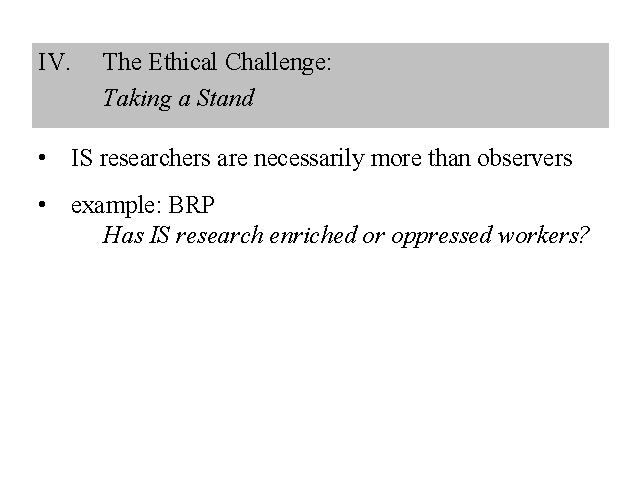   |
 |
   |
 |
IV. The Ethical Challenge:
Taking a Stand
I respect the study of ethics as a sophisticated and well established academic field. MIS Quarterly has published, in its current issue, an article by H. Jeff Smith and John Hasnas, "Ethics and Information Systems: the Corporate Domain." This article refers to the long tradition in philosophy that deals with ethics, as well as the emerging body of research that IS scholars themselves are doing on ethics. In their article, Smith and Hasnas offer three normative theories of ethics: the stockholder theory, the stakeholder theory, and the social contract theory. It's a fascinating article, and I encourage all of you to read it. Unfortunately, it only applies to the corporate domain, whereas I would like to address the ethical issues that also confront scholars in the research domain.
I believe that IS researchers, whether or not they admit it, are always necessarily more than outside observers of information technology. By design or by default, IS researchers change, or reinforce, how information technology is used - and there are major social consequences to this. I offer two examples of this and how the ethical issues arise from it.
For example, consider BPR - business process reengineering - that was all the rage in the early and mid 1990's. In my view, BPR was misused in ways that destroyed the lives of many working people. I recall a special series of articles in the New York Times in 1996, about how mergers and acquisitions among American firms was causing managers - people in their 40's and 50's - to be laid off, all in the name of "business process re-engineering," but this was in name only. The publicly espoused theories of top management and their consultants was that they had no choice but to reengineer their business processes with information technology, or else their companies would fall to the competition. However, another interpretation that also fits the facts is that their actual theory-in-use was to use information technology not to reengineer, but only to automate and reduce headcount. What I saw was the labels of "BPR" and "information technology" ostensibly being used in the name of progress, but they were actually being used to degrade the quality of working life in a short-sighted effort to increase profits. IS researchers and educators who helped to make "BPR" a credible concept contributed, ironically and unwittingly, to this devastating social loss. This is a case in point of how IS research, regardless of the intentions of IS researchers, can be complicit with the harmful consequences of information technology. In response to this, I believe it's not enough simply to teach and do research; we must also take a stand.
The ethical challenge for myself, in my dealings as a scholar with information technology, is a puzzling issue, and I have hardly arrived at any definitive answer for myself, much less for IS scholars in general or the profession at large. However, I believe it's safe to say that any component of any formulation of the ethical challenge would include the following: it's not enough to observe, to study, and to write. It's also necessary to do. And this means to take a stand. I cannot prescribe for others what they should do, but I can prescribe for myself.
A stand I have taken is to promote not just the methodological approaches we use as researchers, but also ourselves as a research community. My chain of reasoning has been: if I want IS research to have pro-social and emancipatory impacts on people working and living in organizations, then the existing quantitative and positivist ways of doing research will have to be supplemented with qualitative, interpretive, and critical ways of doing research. And if I want qualitative, interpretive, and critical approaches to receive mainstream acceptance, it will not be enough to get the methodology right - we will also have to cultivate and develop the people who do the qualitative research. And this has motivated me to do the following. As a program chair, I have deliberately selected discussants and panelists to include a diversity of scholars - not just the famous names to attract an audience, but also the younger scholars, and even doctoral students, who need visibility and exposure. As an editor, I have sometimes chosen not to immediately reject a manuscript that, based on the objective merits, I could have rejected immediately; instead, if I thought the manuscript, and the manuscript's authors, could be cultivated and encouraged - I have chosen to do that. And as an outside reviewer in tenure and promotion cases, I have been objective but also diplomatic, where I have done my best to explain the value and merits of qualitative and interpretive research to deans, department heads, and committee members who, I know, are 90% quantitative and positivist. And I would like to think that my efforts as program chair, as editor, as external reviewer, and in other roles, have all helped to build up the qualitative research community in particular, and the overall IS research community in general.
In short, I see the ethical challenge as calling upon us to move beyond
studying and observing - it means doing. And it means to do things
that - whether directly or indirectly, and whether in the long run or the
short run - would bring out the positive, pro-social, enriching, and emancipatory
impacts of information technology. The examples of what I have done
are necessarily specific to myself and my own values. Given the nature
of ethics, I believe that each individual must decide, based on his or
her own values, what actions are appropriate for himself or herself because,
in the end, there is just one person that you have to answer to - and that
person is yourself.